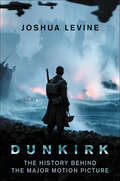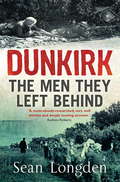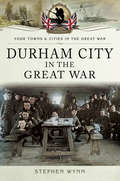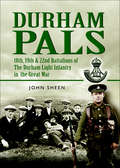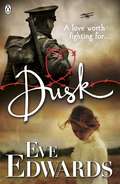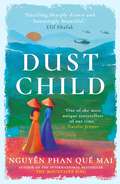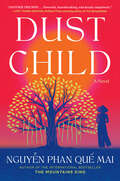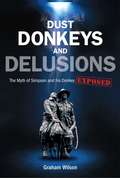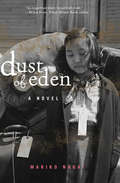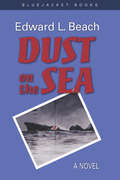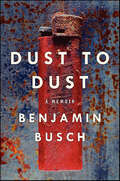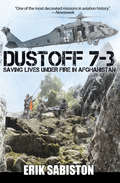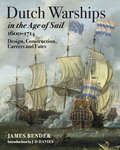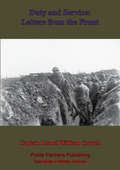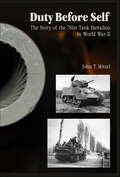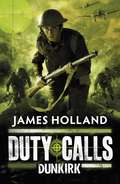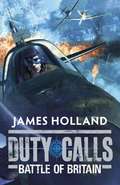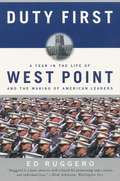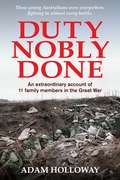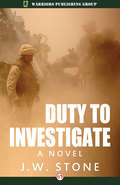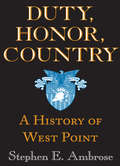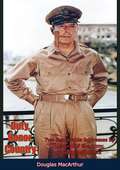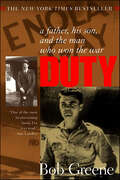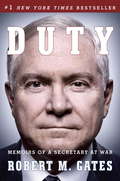- Table View
- List View
Dunkirk: The History Behind the Major Motion Picture
by Joshua LevineNew York Times BestsellerThe epic true story of Dunkirk—now a major motion picture, written and directed by Christopher Nolan, and starring Kenneth Branagh, Tom Hardy, and Mark RylanceIn 1940, the Allies had been beaten back by the Nazis across France to the northern port of Dunkirk. In the ultimate race against time, more than 300,000 Allied soldiers were daringly evacuated across the Channel. This moment of German aggression was used by Winston Churchill as a call to Franklin Roosevelt to enter the war. Now, Joshua Levine, the film's official historian, explores the real lives of those soldiers, bombed and strafed on the beaches for days on end, without food or ammunition; the civilians whose boats were overloaded; the airmen who risked their lives to buy their companions on the ground precious time; and those who did not escape.
Dunkirk: The Men They Left Behind
by Sean LongdenTHE TRUE STORY OF THE 41,000 BRITISH SOLDIERS WHO WERE LEFT BEHIND AFTER THE EVACUATION OF DUNKIRK, MAY 1940'Meticulously researched, very well written and deeply moving' Andrew Roberts'Few readers will be unmoved by Sean Longden's account' Dominic SandbrookAt 2am on the morning of the 3rd of June 1940, General Harold Alexander searched along the quayside, holding onto his megaphone and called "Is anyone there? Is anyone there?" before turning his boat back towards England. Tradition tells us that the dramatic events of the evacuation of Dunkirk, in which 300,000 BEF servicemen escaped the Nazis, was a victory gained from the jaws of defeat. For the first time, rather than telling the tale of the 300,000 who escaped, Sean Longden reveals the story of the 40,000 men sacrificed in the rearguard battles.On the beaches and sand dunes, besides the roads and amidst the ruins lay the corpses of hundreds who had not reached the boats. Elsewhere, hospitals full of the sick and wounded who had been left behind to receive treatment from the enemy's doctors. And further afield - still fighting hard alongside their French allies - was the entire 51st Highland Division, whose war had not finished as the last boats slipped away. Also scattered across the countryside were hundreds of lost and lonely soldiers. These 'evaders' had also missed the boats and were now desperately trying to make their own way home, either by walking across France or rowing across the channel. The majority, however, were now prisoners of war who were forced to walk on the death marches all the way to the camps in Germany and Poland, where they were forgotten until 1945.'Sean Longden is a rising name in military history, and is able to uncover the missing stories of the Second World War' Guardian
Dunkirk: The Men They Left Behind
by Sean LongdenTHE TRUE STORY OF THE 41,000 BRITISH SOLDIERS WHO WERE LEFT BEHIND AFTER THE EVACUATION OF DUNKIRK, MAY 1940'Meticulously researched, very well written and deeply moving' Andrew Roberts'Few readers will be unmoved by Sean Longden's account' Dominic SandbrookAt 2am on the morning of the 3rd of June 1940, General Harold Alexander searched along the quayside, holding onto his megaphone and called "Is anyone there? Is anyone there?" before turning his boat back towards England. Tradition tells us that the dramatic events of the evacuation of Dunkirk, in which 300,000 BEF servicemen escaped the Nazis, was a victory gained from the jaws of defeat. For the first time, rather than telling the tale of the 300,000 who escaped, Sean Longden reveals the story of the 40,000 men sacrificed in the rearguard battles.On the beaches and sand dunes, besides the roads and amidst the ruins lay the corpses of hundreds who had not reached the boats. Elsewhere, hospitals full of the sick and wounded who had been left behind to receive treatment from the enemy's doctors. And further afield - still fighting hard alongside their French allies - was the entire 51st Highland Division, whose war had not finished as the last boats slipped away. Also scattered across the countryside were hundreds of lost and lonely soldiers. These 'evaders' had also missed the boats and were now desperately trying to make their own way home, either by walking across France or rowing across the channel. The majority, however, were now prisoners of war who were forced to walk on the death marches all the way to the camps in Germany and Poland, where they were forgotten until 1945.'Sean Longden is a rising name in military history, and is able to uncover the missing stories of the Second World War' Guardian
Durham City in the Great War (Your Towns & Cities in the Great War)
by Stephen WynnDurham was, and still is, one of the country's oldest and best-loved cites. The very name was synonymous with dedication, dependability and determination. Men from the city answered the call to arms with an eerie normality, no matter what their age or social class. Many had been miners before the war and had spent their working life down a pit, but just as many had been teachers. Others were students at the Durham School, one of the most prestigious in the land, going on to further greatness at Durham University. When the announcement of war was made, they all enlisted to do their duty for King and country. They asked nothing in return, despite knowing the inherent dangers of what they were about to do. They carried on regardless, selfless in their readiness to give to a greater cause.There was a similar determination amongst the city's people. For some that meant working for the local Voluntary Aid Detachment or the Durham Volunteer Training Corps, whilst still going about their day job. They knew that no matter how hard things were for them, it was much more trying for their sons, brothers, husbands, uncles and other loved ones who were fighting on the Western Front.Hundreds went off to fight in the war: men who had been born in the city, who lived and were educated in the city, and men who had worked in the city. Some 360 of them never made it home. They are gone, but never forgotten.
Durham Pals: 18th, 19th, 20th and 22nd Battalions of the Durham Light Infantry in the Great War (Pals Ser.)
by John SheenA history of four battalions of the Durham Light Infantry raised in the Country during the First World War. The 18th (Pals) were the first troops of Kitcheners new army to come under fire, when the Germans bombarded Hartlepool in December 1914. The 19th were raised as Bantams and the 20th (Wearside) were raised by the Sunderland Recruiting Committee. The 22nd, the last raised became a pioneer Battalion but fought as infantry through much of 1918. The book covers raising, training and active service of the Battalions. The 18th were in action on 1 July 1916 when they supported the Leeds and Bradford Pals. After fighting at Messines in June 1917 the 20th went to the Italian front. After losing its Bantams in 1917, the 19th Battalion fought on and distinguished itself in the advance in Flanders in the latter months of 1918. The 22nd Battalion had such a hard time in March and April 1918 that it was rebuilt and again practically wiped out before being disbanded in June 1918.
Dusk
by Eve EdwardsDusk by Eve Edwards is a beautiful love story set against the brutal back drop of WWI.For all fans of Sebastian Faulks and historical fiction - this is Bird Song for young adult readers.A love worth fighting for.When Helen, a young hard-working nurse, meets aristocratic artist Sebastian, she doesn't expect to even like him, let alone fall in love. But against the troubled backdrop of wartime London, an unlikely but intense romance blossoms. And even the bloody trenches of the Somme, where they are both posted, cannot diminish their feelings for each other.But Helen is concealing a secret and when a terrible crime is committed there are devastating consequences for them both.When lives are being lost, can true love survive?Eve Edwards is an award-winning author. She lives in Oxford and is married with three children.www.eve-edwards.com
Dust Child
by Nguy?n Phan Qu? MaiA Library Journal 'Best Book of December 2022' A Most Anticipated Title according to Sydney Morning Herald, Salon, NB Magazine and SheReads 'Dazzling. Sharply drawn and hauntingly beautiful.' Elif Shafak, Women's Prize-shortlisted author of The Island of Missing Trees In 1969, two sisters from rural Việt Nam leave their parents' home and travel to the bustling city of Sài Gòn. Soon their lives are swept up in the unstoppable flames of a war that is blazing through their country. They begin working as 'bar girls' in one of the drinking dens frequented by American GIs, forced to accept that survival now might mean compromising the values they once treasured. Decades later, two men wander through the streets and marketplaces of a very different Sài Gòn: modern, forward-looking, healing. Phong – the son of a Black American soldier and a Vietnamese woman – embarks on a search to find his parents and a way out of Việt Nam, while Dan, a war veteran, hopes that retracing the steps of his youth will ease the PTSD that has plagued him for decades. When the lives of these unforgettable characters converge, each is forced to reckon with the explosive events of history that still ripple through their lives. Now they must work out what it takes to move forward in this richly poetic saga from Nguyễn Phan Quế Mai at her very best.
Dust Child: A Novel
by Que Mai NguyenFrom the internationally bestselling author of The Mountains Sing, a suspenseful and moving saga about family secrets, hidden trauma, and the overriding power of forgiveness, set during the war and in present-day Việt Nam. In 1969, sisters Trang and Quỳnh, desperate to help their parents pay off debts, leave their rural village and become &“bar girls&” in Sài Gòn, drinking, flirting (and more) with American GIs in return for money. As the war moves closer to the city, the once-innocent Trang gets swept up in an irresistible romance with a young and charming American helicopter pilot. Decades later, an American veteran, Dan, returns to Việt Nam with his wife, Linda, hoping to find a way to heal from his PTSD and, unbeknownst to her, reckon with secrets from his past. At the same time, Phong—the son of a Black American soldier and a Vietnamese woman—embarks on a search to find both his parents and a way out of Việt Nam. Abandoned in front of an orphanage, Phong grew up being called &“the dust of life,&” &“Black American imperialist,&” and &“child of the enemy,&” and he dreams of a better life for himself and his family in the U.S. Past and present converge as these characters come together to confront decisions made during a time of war—decisions that force them to look deep within and find common ground across race, generation, culture, and language. Suspenseful, poetic, and perfect for readers of Min Jin Lee&’s Pachinko or Yaa Gyasi&’s Homegoing, Dust Child tells an unforgettable and immersive story of how those who inherited tragedy can redefine their destinies through love, hard-earned wisdom, compassion, courage, and joy.
Dust Donkeys and Delusions: The Myth of Simpson and his Donkey Exposed
by Graham WilsonDust, Donkeys and Delusion examines and clinically debunks the myth that has grown up around Private John Simpson Kirkpatrick, the so-called `Man with the Donkey', the quintessential Australian `hero' of Gallipoli. While the various elements of the Simpson myth have now become popularly accepted as `history', Dust, Donkeys and Delusion shows clearly, based on historical documents, both official and unofficial, that almost every word ever spoken or written about Simpson following his death is false.
Dust of Eden
by Mariko Nagai<P>We lived under a sky so blue in Idaho right near the towns of Hunt and Eden but we were not welcomed there. <P>In early 1942, thirteen-year-old Mina Masako Tagawa and her Japanese American family are sent from their home in Seattle to an internment camp in Idaho. What do you do when your home country treats you like an enemy? <P>This memorable and powerful novel in verse, written by award-winning author Mariko Nagai, explores the nature of fear, the value of acceptance, and the beauty of life. As thought-provoking as it is uplifting, Dust of Eden is told with an honesty that is both heart-wrenching and inspirational.
Dust on the Sea
by Edward L. BeachIn 1972, following the huge success of Run Silent, Run Deep, Edward L. Beach's second novel of submarine warfare was published to great acclaim. Like its predecessor, Dust on the Sea was lauded for its authentic portrayal of what it meant to be a submariner during the desperate years of World War II. Tense, dramatic and rich in technical and tactical detail, the book draws on Beach's experience as a submariner in the US Navy to describe the commander and crew of the fictitious USS Eel as they battle overwhelming odds to destroy Japanese ships and save American lives. With no margin for error, the men withstand storms, depth charges and even hand-to-hand combat to defend their boat and themselves. Mistakes, as the title reminds us, result in the debris which serves as a brief grave maker for sunken ships: dust on the sea.
Dust to Dust: A Memoir
by Benjamin Busch“A wonderful book, original in concept and stunningly written.”—Ward Just“Elegiac, funny, wistful, deep, and wonderfully human, Dust to Dust moved me to laughter and tears, sometimes simultaneously.”—Karl Marlantes, bestselling author of Matterhorn and What It Is Like to Go to WarTim O’Brien meets Annie Dillard in this remarkable memoir by debut author Benjamin Busch. Much more than a war memoir, Dust to Dust brilliantly explores the passage through a lifetime—a moving meditation on life and death, the adventures of childhood and revelations of adulthood. Seemingly ordinary things take on a breathtaking radiance when examined by this decorated Marine officer—veteran of two combat tours in Iraq—actor on the hit HBO series The Wire, and son of acclaimed novelist Frederick Busch. Above all, Benjamin Busch is a truly extraordinary new literary talent as evidenced by his exemplary debut, Dust to Dust—an original, emotionally powerful, and surprisingly refreshing take on an American soldier’s story.
Dustoff 7-3: Saving Lives Under Fire in Afghanistan
by Erik SabistonDustoff 7-3 tells the true story of four unlikely heroes in the rugged mountains of Afghanistan, where medics are forced to descend on wires to reach the wounded and helicopter pilots must fight wind, weather, and enemy fire to pluck casualties from some of the world's most difficult combat arenas. Complete opposites thrown together, cut off, and outnumbered, Chief Warrant Officer Erik Sabiston and his flight crew answered the call in a race against time, not to take lives--but to save them. The concept of evacuating wounded soldiers by helicopter developed in the Korean War and became a staple during the war in Vietnam where heroic, unarmed chopper crews flew vital missions known to the grateful grunts on the ground as Dustoffs. The crew of Dustoff 7-3 carried on that heroic tradition, flying over a region that had seen scores of American casualties, known among veterans as the Valley of Death. At the end of Operation Hammer Down, they had rescued 14 soldiers, made three critical supply runs, recovered two soldiers killed in action, and nearly died. It took all of three days.
Dutch Warships in the Age of Sail, 1600–1714: Design, Construction, Careers and Fates
by James BenderThis definitive study presents a complete account of the Dutch Republic&’s naval fleet during its golden age as a world power. The Netherlands was by far the most important maritime power of the seventeenth century. It dominated seaborne trade with the largest merchant fleet in the world. Born out of an 80-year struggle against Spain for independence, the Dutch republic relied on naval power to protect its freedom, promote its trade and defend its overseas colonies. Yet the ships that made up its fleets are among the least studied of any in the age of sail. This is partly because a decentralized administration of five separate admiralties, often producing ships of the same name at the same time, as well as competing systems of measuring ships, all lead to confusion and error. In this comprehensive volume, James Bander delivers the first definitive listing of all Dutch fighting ships—whether purpose-built, purchased, hired or captured—from the heyday of the United Provinces. Each entry is complete with technical details and summaries of the ship&’s career. It also provides administrative, economic and technical background, and outlines the many campaigns fought by one of the most successful navies in history.
Duty And Service: Letters From The Front.
by Captain Lionel William CrouchCaptain Crouch had served in the Territorial Army for some years before the cataclysmic struggle in Europe began in 1914. Unlike all the other belligerent parties, Britain did not, and still does not, have standing military conscription; the Regular Army of full-time highly trained volunteers provide the first line soldiers. Bolstering the first line soldiers were the part-time volunteers of the Territorial Army, providing additional manpower and more limited service. However, during both World Wars the men of the Territorial Army were in dire necessity of the time pressed forward into the line as fighting divisions, the men eager to bring the fight to the enemy.Our Author's war time service in the Oxford and Buckinghamshire Light Infantry started the moment that war broke out, from August 1914 to March 1915; he and his men trained to reach a peak of efficiency. This moment could not come too soon: the first seven divisions of the Regular Army that had formed the initial expeditionary forces had ceased to exist in the face of overwhelming number of the enemy. The Territorials and other Reserve forces from all over the British empire rushed to France and were plunged into the thick of the fighting amongst the trenches.Captain Crouch's letters form an unbroken stream between the mobilization, and are in equal part illuminating and evocative of the life of a young man who fell in service to his country. Although place-names were omitted from his letters due to censorship of the time , he was interred at Pozières British Cemetery, Ovillers-La Boisselle, meaning that he probably fell in this area during the battle of the Somme.An engaging read.Author -- Captain Lionel William Crouch (1886-1916)Text taken, whole and complete, from the edition published for private circulation 1917.Original Page Count - 158 pages.
Duty Before Self: The Story of the 781st Tank Battalion in World War II
by John T. MitzelIn January 1943, and as World War II entered its second year it was evident that U.S. tanks were outgunned, under-armored, and underpowered. In short, they weren't cutting the mustard, but there was no time for a long development project. At Fort Knox, Kentucky, the newly-formed 781st Tank Battalion was detailed to run an around-the-clock marathon comparison test on forty Sherman tanks to find the best available configuration and fastest solution. When the results of the "Million Dollar Tank Test" were collected, what resulted was the Sherman "Easy Eight," an easier to manufacture tank that was also such an effective fighting vehicle that it would serve for another thirty years. The 781st Tank Battalion shipped out to Europe, where, equipped with the "Easy Eight," it thwarted Hitler’s last major offensive in the West – Operation Nordwind – and swept southern Germany as the tip of the U.S. Seventh Army’s sword.
Duty Calls: Dunkirk (Duty Calls)
by James Holland'YOU WANTED TO SEE SOME ACTION - WELL YOU'RE GOING TO GET IT NOW. YOU'RE GOING TO GET IT NOW ALL RIGHT.'Friday 24th May, 1940Private Johnny Hawke, aged sixteen, awakens to artillery fire.Hours later, Stukas scream down from the sky. Messerschmit fighters roar towards his regiment. Trucks burst into flames.Now men and mules lay dead and dying, severed limbs twisted grotesquely as blood soaks the cobbled streets.Young Private Hawke just wants to do his duty and serve his country. But as he - and his fellow soldiers - prepare to stop the German advance, there's only one question on everyone's lips.HOW WILL THEY SURVIVE?
Duty Calls: World War 2 Fiction (Duty Calls)
by James HollandPilot officer Archie Jackson, 19, is in control of the RAF's newest fighter aircraft, a Supermarine Spitfire.Now he has the Luftwaffe in his sights and only one thing matters: defending Britain. Suddenly planes are falling from the sky, exploding and spiralling into the English Channel.France has fallen and the swastika flies over Occupied Europe. Only these young pilots - barely out of boyhood - stand between Britain and a Nazi invasion . . . Duty Calls: Battle of Britain, throws you deep into the heart - and horror - of Britain's darkest, and finest, hour.** Historian James Holland is the bestselling author of the Jack Tanner adult war fiction books. Duty Calls is his first series for younger readers, and showcases his expertise on the Second World War. ** James Holland presented Battle of Britain: The Real Story on BBC2.
Duty First
by Ed RuggeroDuty First is a penetrating account of a year inside one of America's premier schools for leadership -- the United States Military Academy -- as it celebrates the bicentennial of its founding. Ed Ruggero, a former West Point cadet and professor, takes an incisive look at how this elite school builds the "leaders of character" who will command the nation's military. Writing with deep insight and superb narrative skill, Ruggero follows the cadet's tumultuous lives: the initial grueling training; the strict student hierarchy and intense classroom work; and the interaction between the lowly first-year plebes and the upper-class cadets who train them. Duty First also shows the role played by the majors, captains, and sergeants, who oversee everything that happens at this unique institution.
Duty Nobly Done: An Extraordinary Account of 11 Family Members in the Great War
by Adam HollowayThis is the extraordinary true story of 11 young Australian men from one extended family and their experiences in the great adventure that would change their lives — the Great War. Author Adam Holloway, a direct descendant, takes the reader into the lives of each of these men as they embark on a journey from which they are unlikely to return. These were young, confident men who revelled in the brash optimism of a young nation. They were desperate to prove themselves, eager to assert the justice of their cause and keen for a taste of the excitement and comradeship of battle. They were not expecting to be plunged into a lingering nightmare characterised by the stench of death and putrefaction, overwhelming fear and despair, and the gnawing uncertainty of survival. Holloway uses personal letters, diaries and family memories to deftly recreate the nail-biting tension as each man experiences his own baptism of fire amid the utter horror of the sights and sounds of battle. From the craggy cliffs of Gallipoli to the insatiable maw of the Western Front, these brothers and cousins step forward to take their turn in a procession of courage, each determined to do his duty and to look after his battalion brothers. This is a story that portrays the Great War on a personal level, describing in remarkable detail how it felt to fight in the worst conflict the world had known, a conflict that would change these young men and Australian society forever.
Duty to Investigate: A Novel
by J. W. StoneAs a successful trial lawyer, Mike Beck uses his personality and his skill with the letter of the law to win in a courtroom. As a marine reservist ordered to Iraq on an unexpected deployment, he finds himself in a different world where the law of war often conflicts with common sense and his own feel for what's right and what's wrong.When an embedded female correspondent reveals what appears to be an illegal killing of Iraqi civilians by a US marine during the battle for Fallujah, Beck finds himself faced with a case that challenges both his legal skills and his conviction that something is very wrong with what seems to be a clear violation of the law of land warfare. Devoted to finding the truth about an ugly incident and keeping an innocent marine from being convicted in a court-martial, Mike Beck defies orders, purloins evidence, and leads a combat team that must fight its way through a fanatical enemy force to investigate the scene of the alleged crime.Along the way as he battles his conscience, command influence, and a media giant clamoring for his head, Mike Beck finds a lot of truth about the case, about the brutal enemy in Iraq, about the nature of a very nasty war, about the marines risking their lives in a confusing combat situation--and about himself as a marine, a lawyer, and a man.
Duty, Honor, Country: A History of West Point
by Stephen E. AmbroseA New York Times bestselling author writes about West Point.This new paperback edition of Stephen E. Ambrose's highly regarded history of the United States Military Academy features the original foreword by Dwight D. Eisenhower and a new afterword by former West Point superintendent Andrew J. Goodpaster.
Duty, Honor, Country: Two Memorable Addresses by General of the Army, Douglas MacArthur
by Douglas MacArthurThe present volume, first published in 1962, consists of two distinguished speeches given by the General of the U.S. Army, Douglas MacArthur.The first address took place on April 19, 1951 and was held before a joint meeting of the two houses of United States Congress—the House of Representatives and the Senate—and took place in the Hall of the House of Representatives. This meeting followed on just one week from MacArthur’s removal from command by President Harry S. Truman.The second address was held on May 12, 1921 and was given to The Members of the Association of Graduates, U.S.M.A., The Corps of Cadets, and Distinguished Guests. It was given on the occasion of MacArthur’s acceptance of the Sylvanus Thayer Award for outstanding service to the nation, which had gone to Eisenhower the year before. The event was held at the United States Military Academy in West Point, New York.
Duty: A Father, His Son, and the Man Who Won the War
by Bob GreeneWhen Bob Greene went home to central Ohio to be with his dying father, it set off a chain of events that led him to knowing his dad in a way he never had before—thanks to a quiet man who lived just a few miles away, a man who had changed the history of the world.Greene's father—a soldier with an infantry division in World War II—often spoke of seeing the man around town. All but anonymous even in his own city, carefully maintaining his privacy, this man, Greene's father would point out to him, had "won the war." He was Paul Tibbets. At the age of twenty-nine, at the request of his country, Tibbets assembled a secret team of 1,800 American soldiers to carry out the single most violent act in the history of mankind. In 1945 Tibbets piloted a plane—which he called Enola Gay, after his mother—to the Japanese city of Hiroshima, where he dropped the atomic bomb.On the morning after the last meal he ever ate with his father, Greene went to meet Tibbets. What developed was an unlikely friendship that allowed Greene to discover things about his father, and his father's generation of soldiers, that he never fully understood before. Duty is the story of three lives connected by history, proximity, and blood; indeed, it is many stories, intimate and achingly personal as well as deeply historic. In one soldier's memory of a mission that transformed the world—and in a son's last attempt to grasp his father's ingrained sense of honor and duty—lies a powerful tribute to the ordinary heroes of an extraordinary time in American life.What Greene came away with is found history and found poetry—a profoundly moving work that offers a vividly new perspective on responsibility, empathy, and love. It is an exploration of and response to the concept of duty as it once was and always should be: quiet and from the heart. On every page you can hear the whisper of a generation and its children bidding each other farewell.
Duty: Memoirs of a Secretary at War
by Robert M GatesFrom the former secretary of defense, a strikingly candid, vivid account of serving Presidents George W. Bush and Barack Obama during the wars in Iraq and Afghanistan. When Robert M. Gates received a call from the White House, he thought he'd long left Washington politics behind: After working for six presidents in both the CIA and the National Security Council, he was happily serving as president of Texas A&M University. But when he was asked to help a nation mired in two wars and to aid the troops doing the fighting, he answered what he felt was the call of duty.
